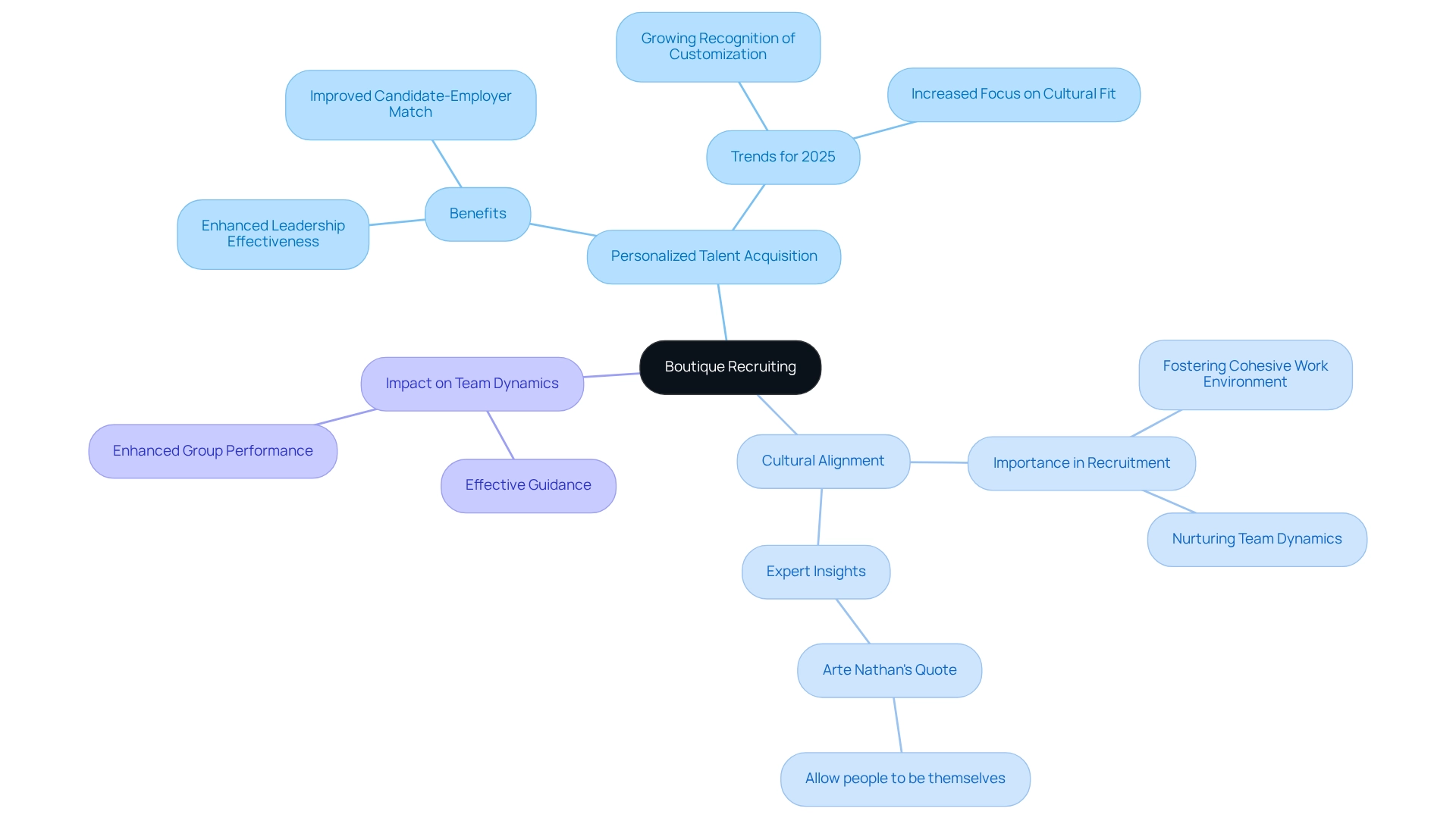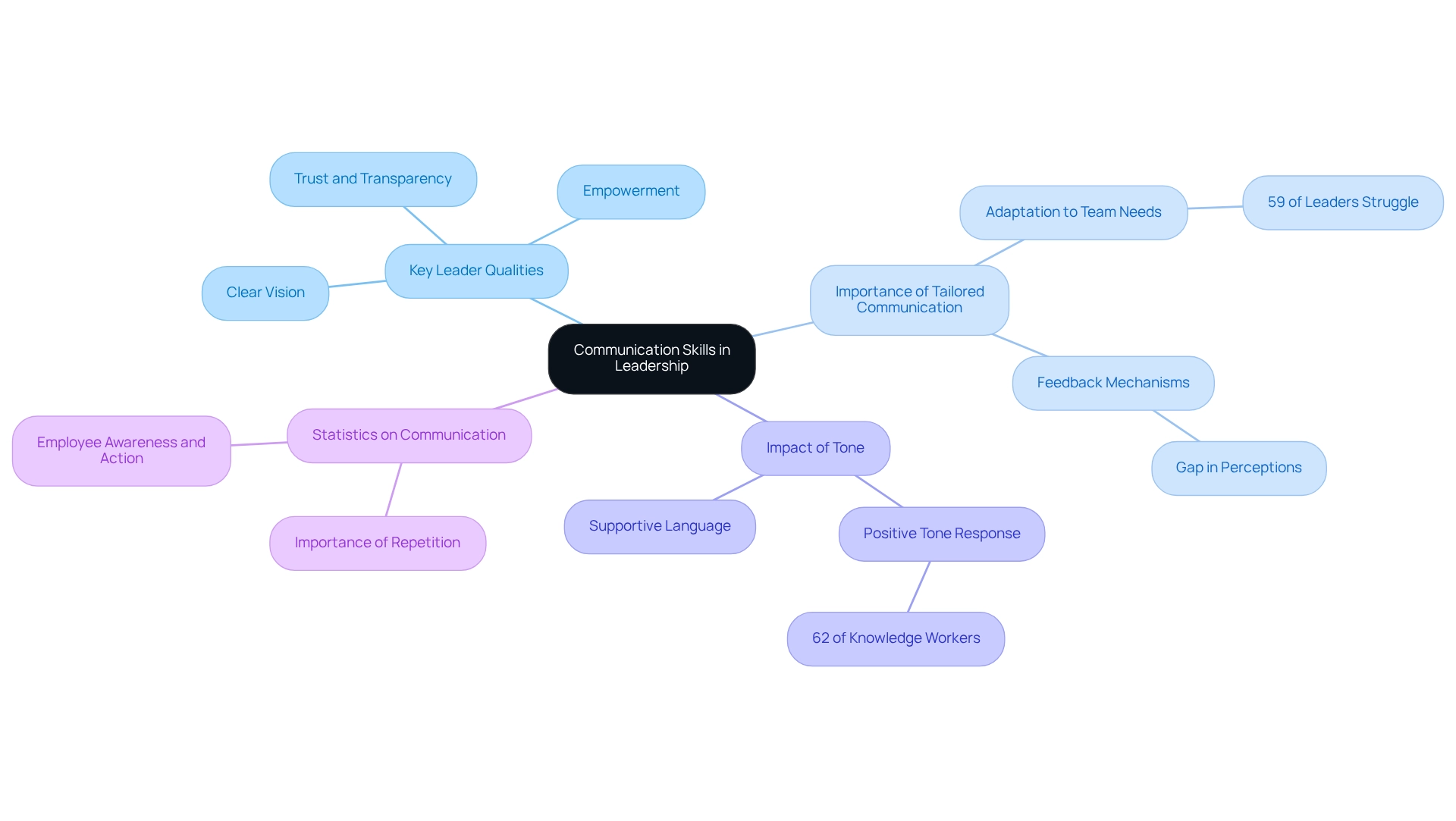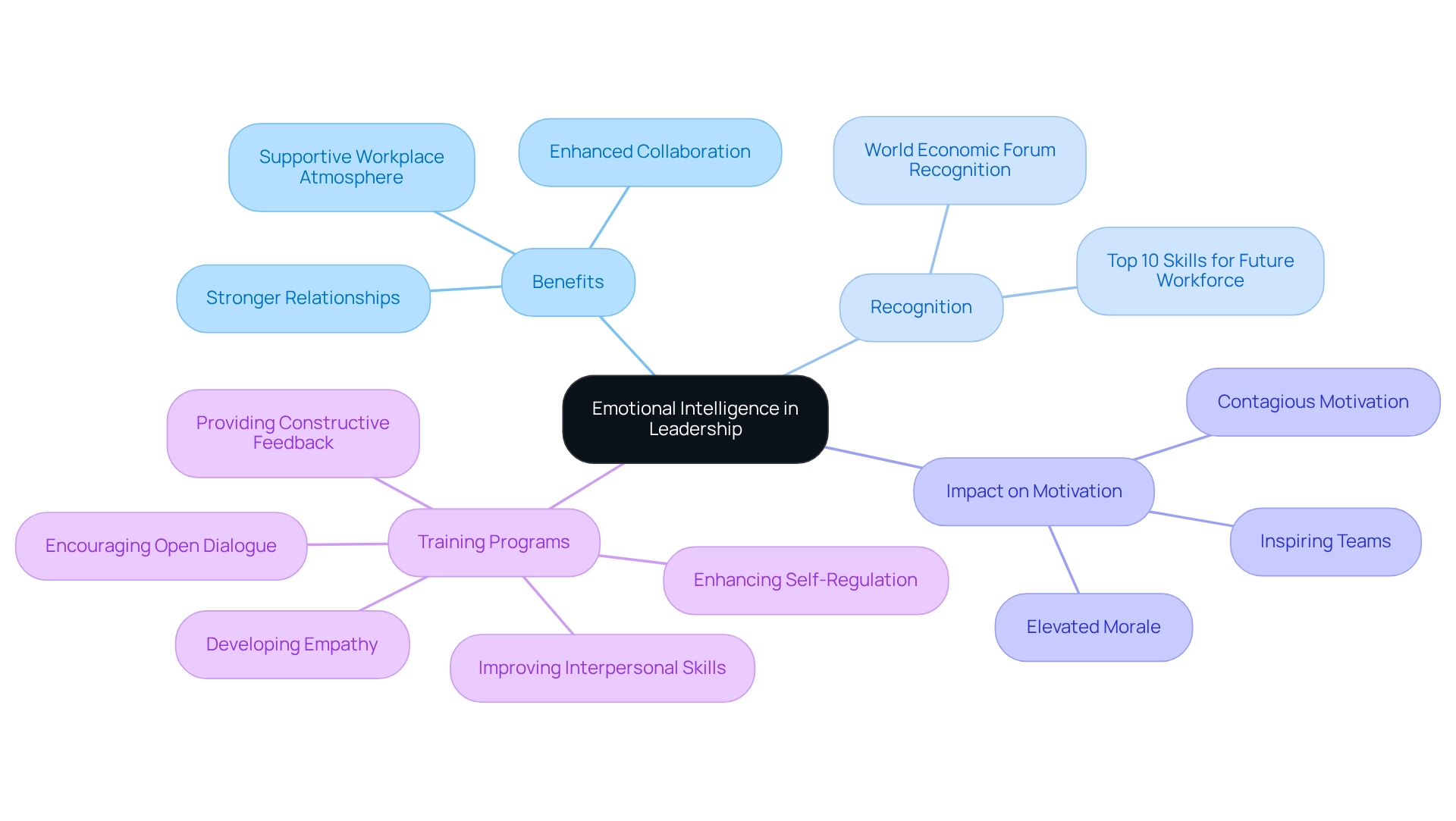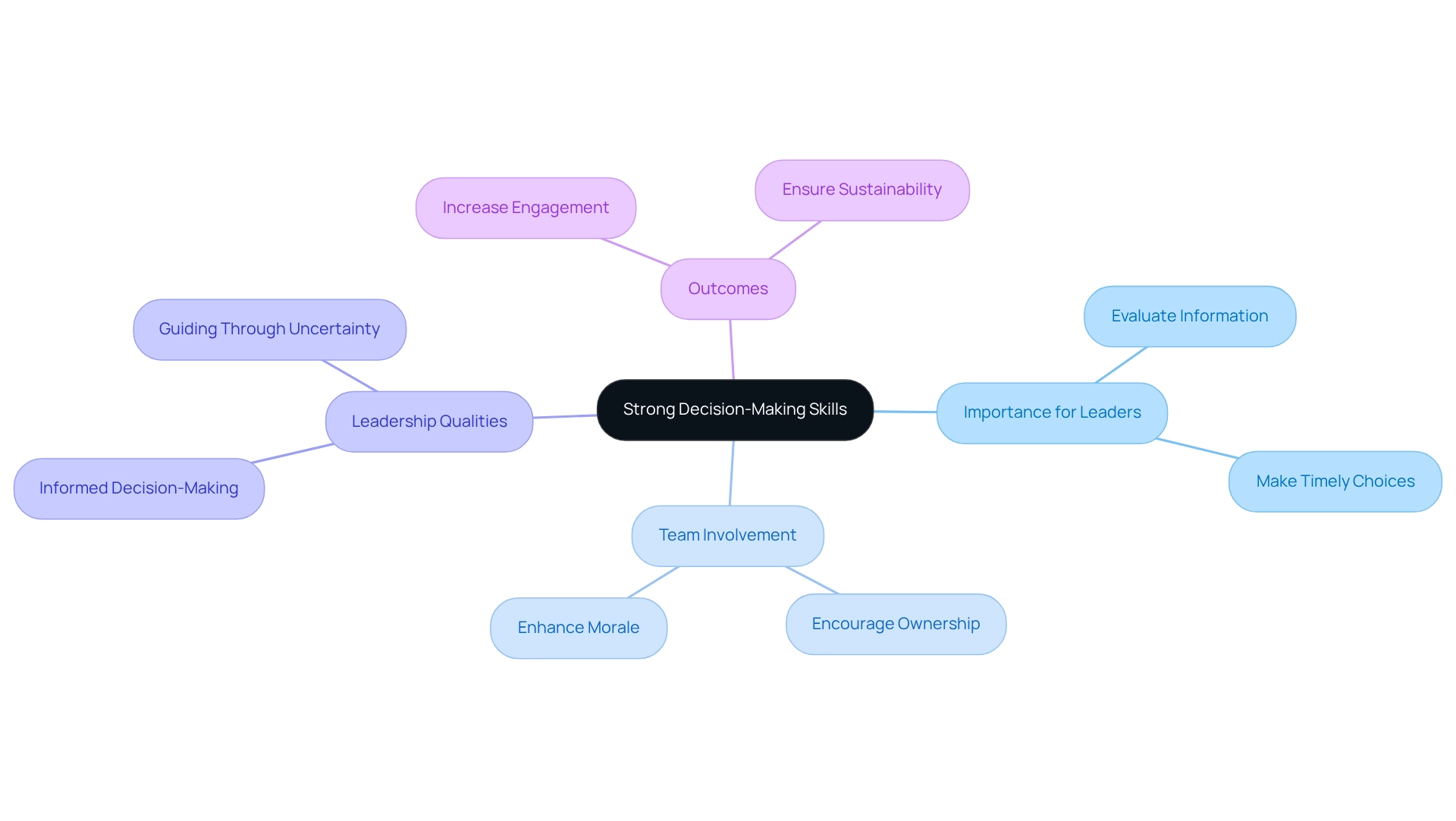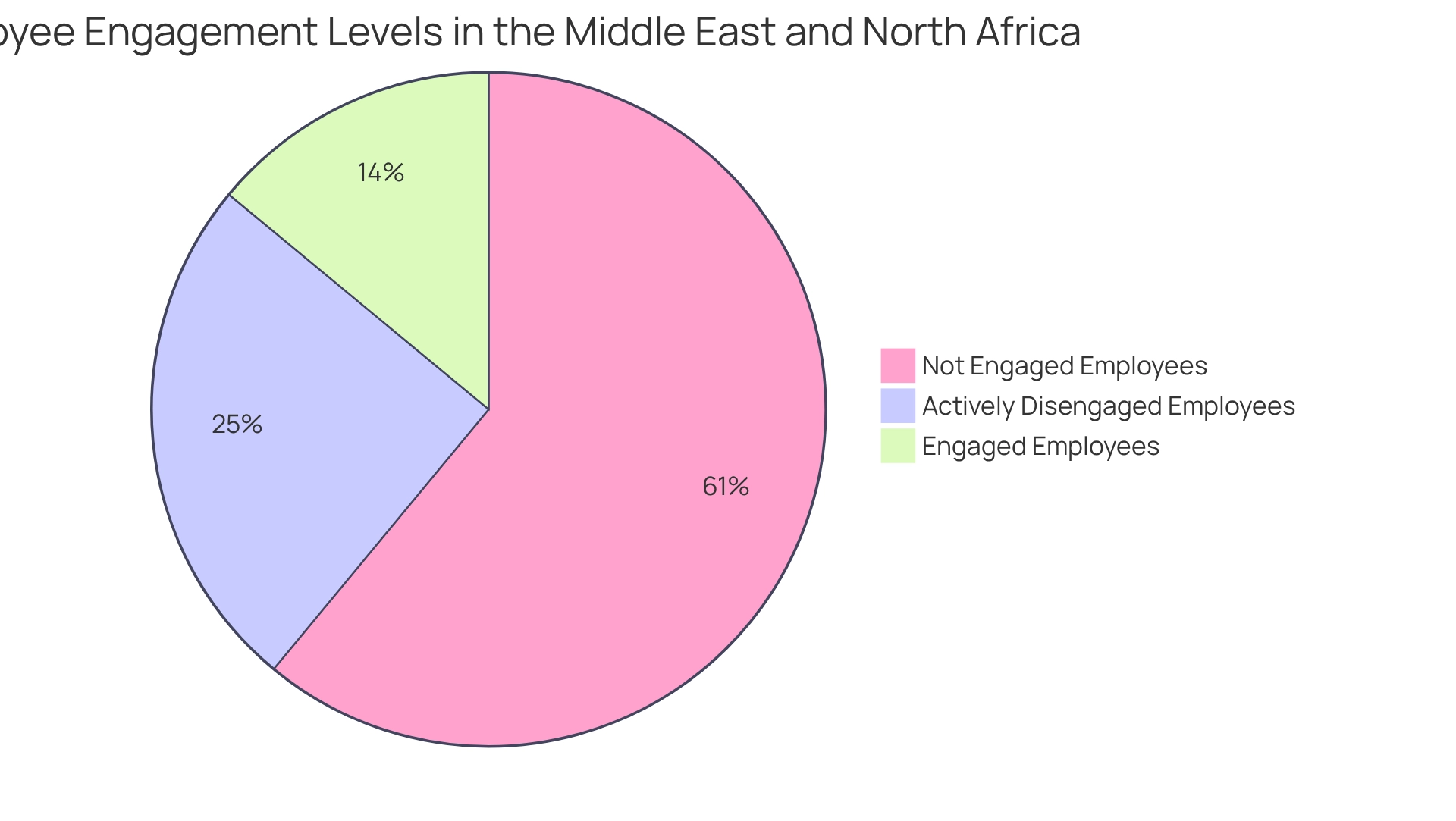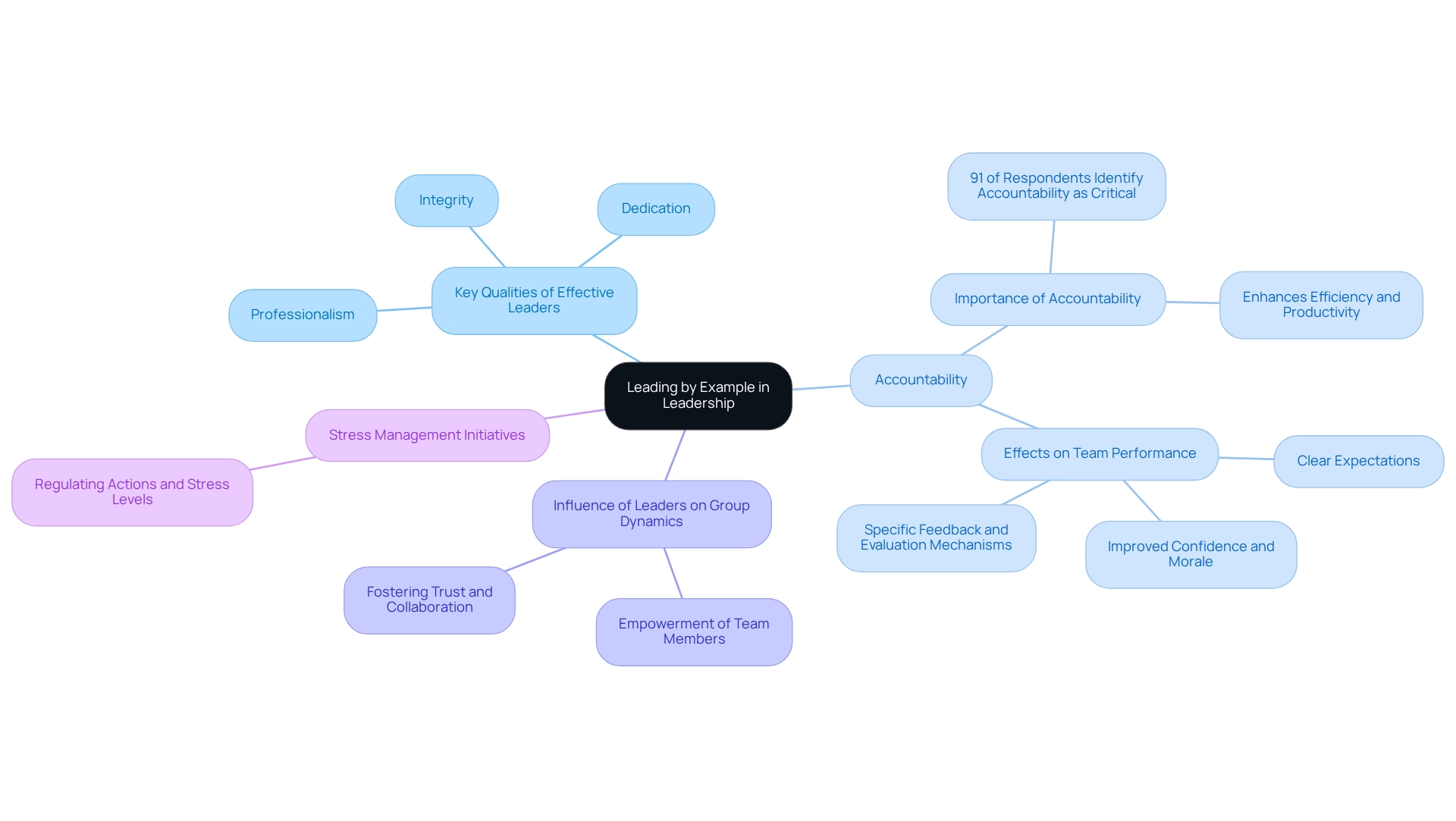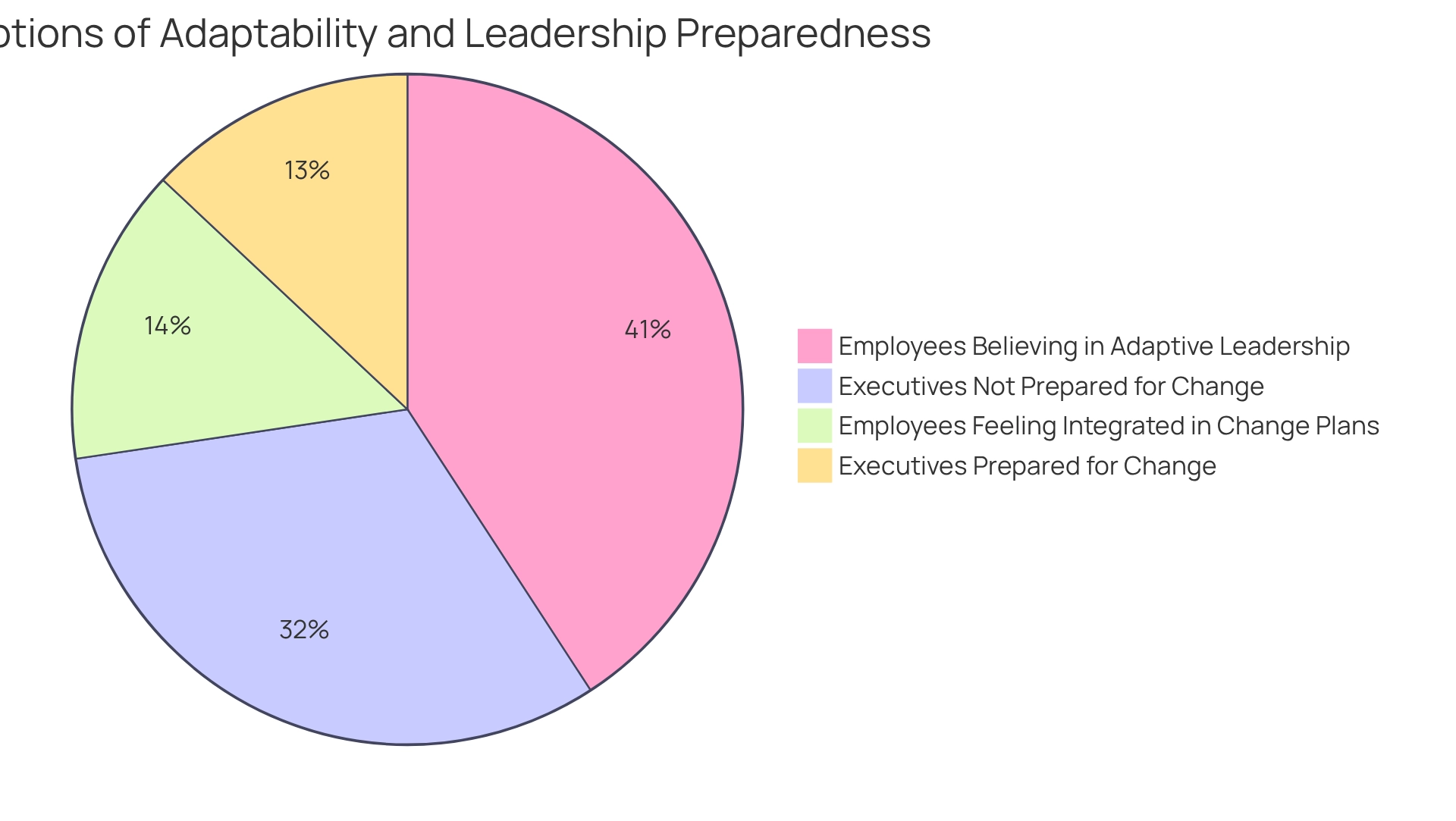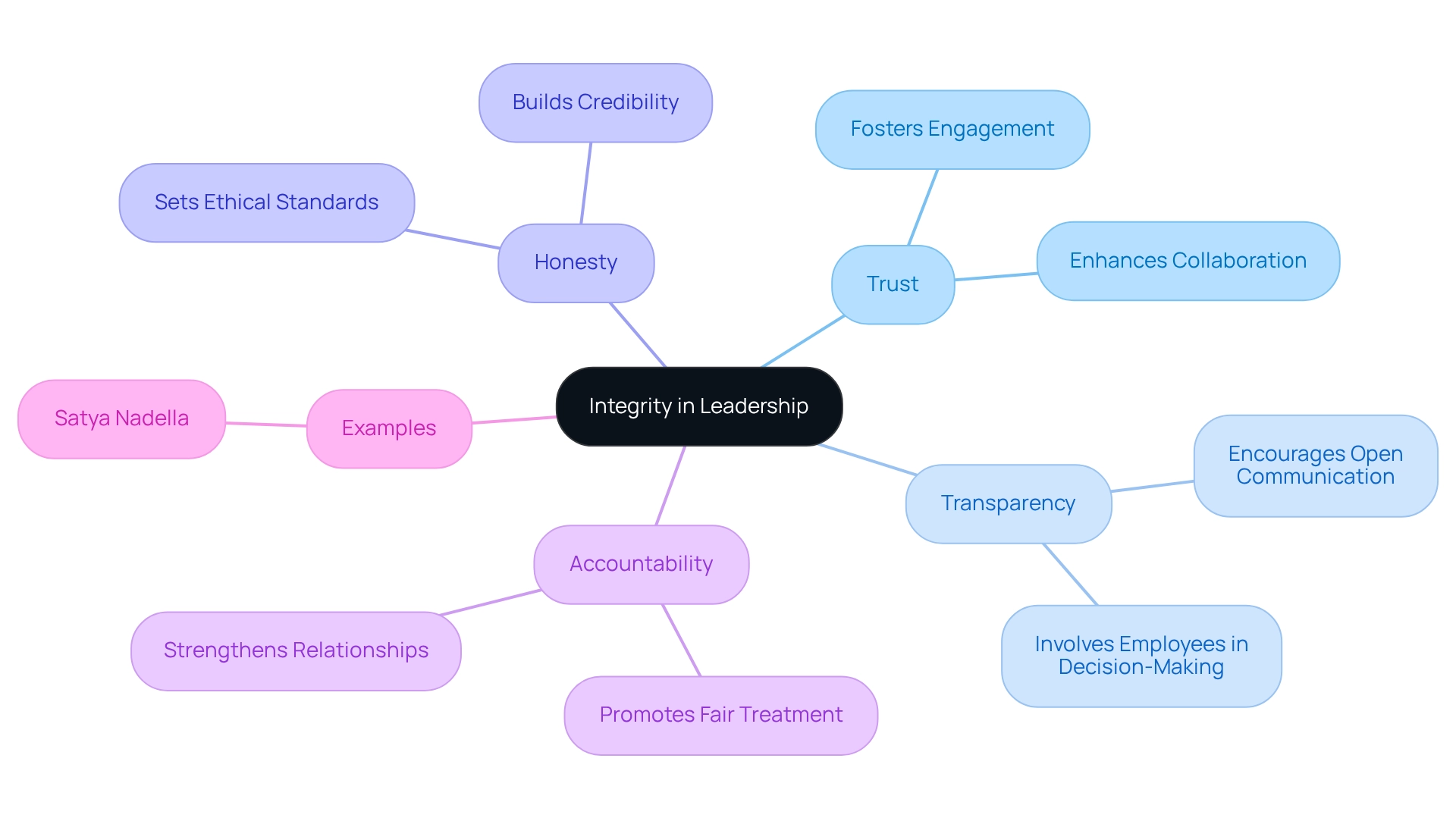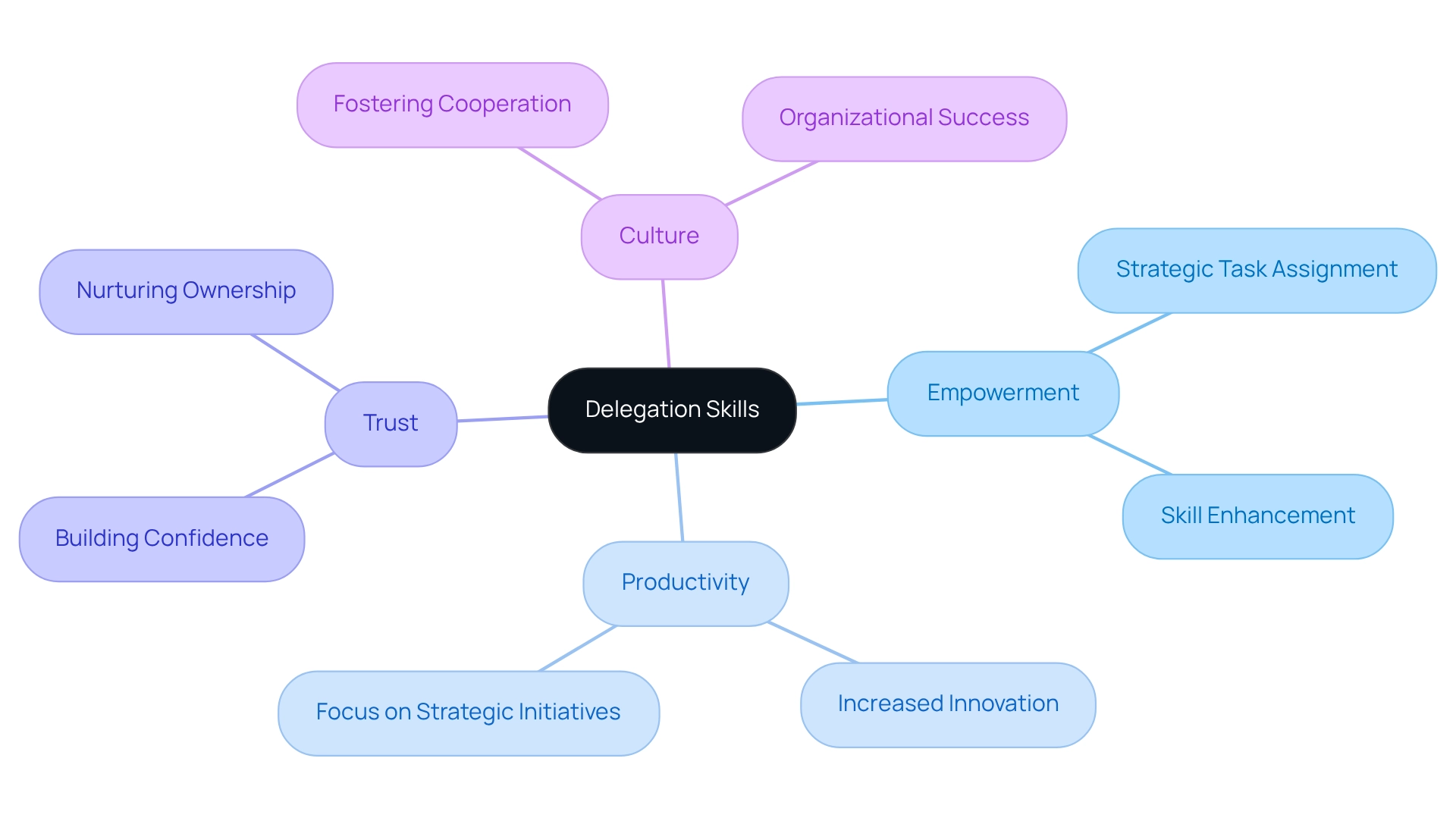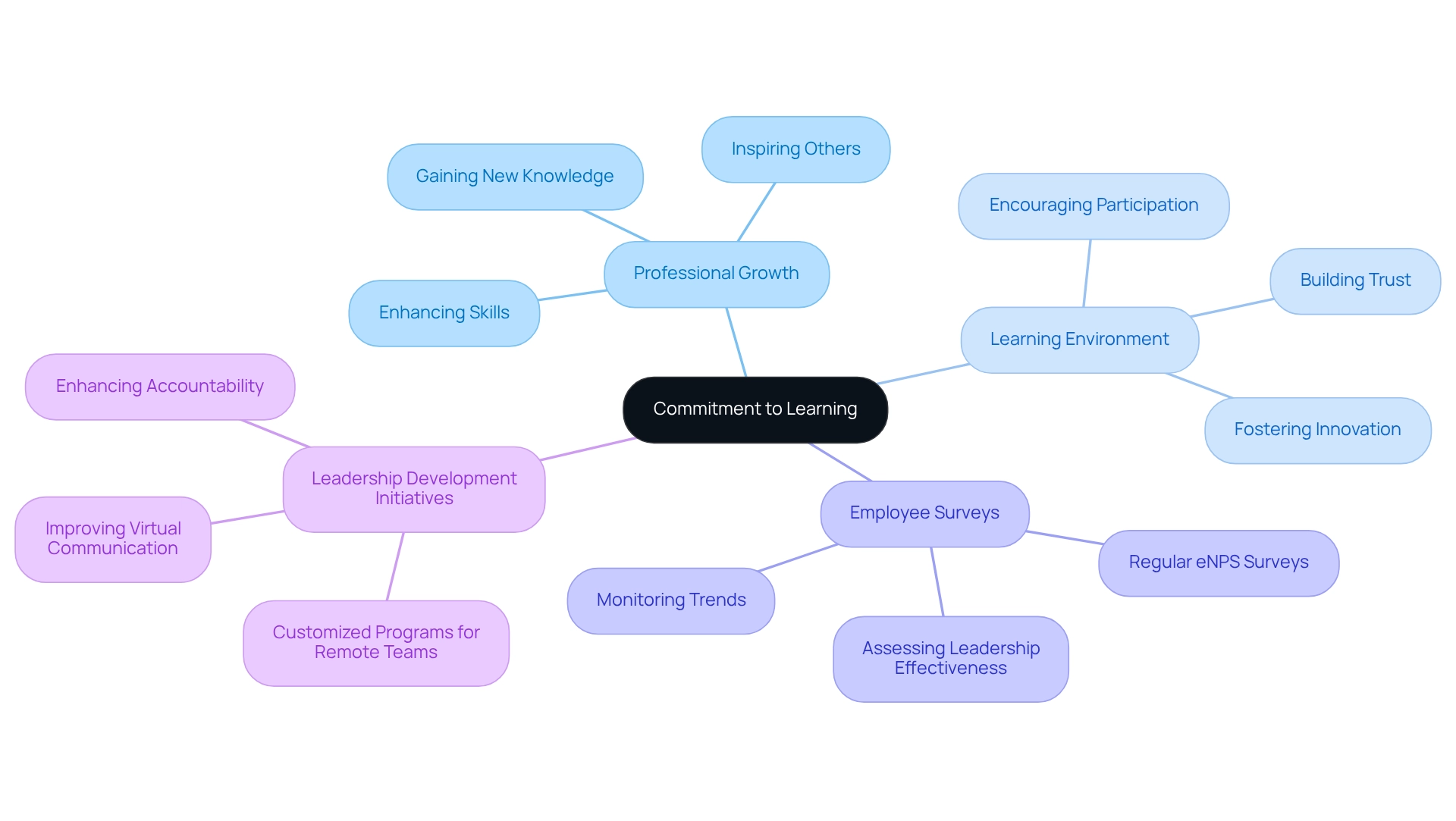Overview
The most effective team leaders possess qualities such as:
- Strong communication skills
- Emotional intelligence
- Decision-making abilities
- Adaptability
These attributes collectively create a supportive and high-performing team environment. Such qualities not only enhance leader effectiveness but also significantly boost team morale and engagement. They empower leaders to forge connections with their teams, navigate challenges, and cultivate a culture of continuous learning and accountability.
How can these essential traits transform your leadership approach and elevate your team’s performance?
Key Highlights:
- Boutique Recruiting focuses on personalized talent acquisition to match candidates with organizational culture, enhancing leadership effectiveness.
- Customized recruitment fosters a cohesive work environment, allowing leaders to nurture their teams effectively.
- Effective communication skills are critical for leaders to express their vision, motivate teams, and resolve conflicts.
- Emotional intelligence enables leaders to build strong relationships and foster a supportive workplace atmosphere.
- Strong decision-making skills are essential for guiding teams through challenges and enhancing morale.
- Motivational skills empower leaders to inspire teams, improve engagement, and align individual and organizational goals.
- Leading by example establishes accountability and sets performance standards, fostering a culture of excellence.
- Adaptability is crucial for navigating change, with leaders needing to align strategies with team operations.
- Integrity builds trust and respect, contributing to a high-performing and collaborative work environment.
- Delegation skills empower team members, enhance productivity, and allow leaders to focus on strategic initiatives.
- A commitment to continuous learning fosters innovation and encourages team members to engage in personal growth.
Introduction
In the dynamic landscape of modern leadership, the qualities that define effective leaders are evolving, emphasizing the need for a multifaceted approach to team management. As organizations strive to foster high-performing teams, attributes such as adaptability, emotional intelligence, and strong communication skills have emerged as critical components for success.
This article delves into the essential skills that leaders must cultivate to not only inspire their teams but also navigate the complexities of today’s work environment. From the importance of integrity and delegation to the commitment to continuous learning, each element plays a pivotal role in shaping a cohesive and motivated workforce.
By understanding and implementing these strategies, leaders can create an environment that drives performance while nurturing growth and innovation within their teams.
Boutique Recruiting: Personalized Talent Acquisition for Effective Team Leadership
Boutique Recruiting stands out in the competitive personnel placement landscape by committing to personalized talent acquisition across diverse industries in the U.S. and Canada. This strategic approach guarantees that employers and candidates are matched according to their unique needs and organizational culture. By thoroughly understanding each client’s specific requirements, Boutique Recruiting enhances leadership effectiveness, delivering candidates who not only possess the requisite skills but also align with the company’s values and objectives.
The significance of customized recruitment cannot be overstated; it fosters a cohesive work environment where individuals can thrive. Customized hiring approaches significantly influence group dynamics, as supervisors are better equipped to guide individuals who resonate with the organizational ethos. This alignment is essential for fostering effective guidance, enabling leaders to demonstrate the best team leader qualities by focusing on nurturing their teams rather than addressing discrepancies.
As we look toward 2025, the trend of personalized talent acquisition continues to gain momentum, with companies increasingly recognizing its role in driving management success. Current statistics reveal that effective brand identity in recruitment can reduce cost-per-hire, underscoring the financial advantages of a tailored approach. Case studies illustrate that organizations utilizing comprehensive recruitment services across various sectors—such as accounting, marketing, human resources, and technical positions—experience enhanced group performance and satisfaction. As industry expert Arte Nathan asserts, “Allow people to be themselves. People want to be great; great companies let them be great.” This statement highlights the importance of cultural alignment in recruitment, which is vital for effective management.
Ultimately, Boutique Recruiting’s meticulous focus on understanding company culture and specific job requirements positions it as a trusted partner for organizations seeking to enhance their management teams by identifying candidates with the best team leader qualities through effective recruitment strategies. HR managers are urged to adopt tailored recruitment strategies by actively engaging with candidates to understand their unique strengths and how they align with the company’s mission, thereby fostering a more effective management environment.
Communication Skills: The Cornerstone of Effective Team Leadership
Effective communication abilities are considered some of the best team leader qualities for successful group leadership. Leaders must clearly express their vision, give specific instructions, and foster an atmosphere where members feel empowered to share their ideas and concerns. This approach not only aligns group objectives but also fosters trust and transparency within the collective. Individuals who excel in communication can motivate their groups, resolve conflicts effectively, and ensure alignment, ultimately enhancing group performance and morale.
Consider this: recent studies indicate that 59% of top individuals struggle to adapt their communication styles to meet the needs of their groups. This statistic underscores the necessity for tailored communication strategies that resonate with group members. Furthermore, a report from 2024 revealed a notable gap between leaders’ perceptions and employees’ beliefs regarding feedback opportunities. This gap directly affects group communication and trust, indicating that organizations must improve their feedback mechanisms to create a more open and communicative environment.
The tone of communication also plays a crucial role. A staggering 62% of knowledge workers are more likely to respond quickly to messages that convey a positive tone. Leaders can foster a positive atmosphere by employing supportive language, showing gratitude, and sustaining an optimistic perspective. Such measures can significantly enhance involvement among group members. By reiterating key messages through various channels—group meetings, emails, and casual check-ins—leaders can ensure increased awareness and prompt action among members, which exemplifies the best team leader qualities. In conclusion, the capability to communicate efficiently is a fundamental aspect of successful leadership, directly influencing dynamics and overall performance. Leaders who prioritize communication abilities exemplify the best team leader qualities, which better equips them to guide their groups toward achievement. Are you ready to enhance your leadership communication skills and drive your team to success?
Emotional Intelligence: Building Stronger Team Connections
Emotional intelligence (EQ) is among the best team leader qualities, as it enables effective individuals to forge stronger relationships with their group members. Leaders who demonstrate the best team leader qualities possess the ability to empathize with their group’s emotions, manage their own emotional responses, and adeptly navigate interpersonal dynamics. This skill set cultivates a supportive workplace atmosphere where colleagues feel valued and understood, ultimately fostering enhanced collaboration and productivity, reflecting the best team leader qualities.
Highlighting emotional intelligence empowers managers to establish a culture of trust and respect, which is fundamental for the success of high-performing teams. The World Economic Forum has recognized emotional intelligence as one of the best team leader qualities essential for the future workforce, emphasizing its significance in leadership roles.
Furthermore, research indicates that individuals who possess the best team leader qualities, including robust emotional intelligence, can significantly impact group dynamics, motivating and engaging members effectively. A case study illustrating the influence of emotional intelligence on group motivation reveals that self-driven individuals with high EQ can inspire their teams to strive for success. This contagious motivation not only elevates morale but also contributes to overall productivity.
By embracing emotional awareness, leaders can substantially enhance group collaboration, which is one of the best team leader qualities, leading to improved outcomes and a more cohesive work environment. To nurture emotional awareness within management teams, HR managers should consider implementing training programs dedicated to developing empathy, self-regulation, and interpersonal skills. Encouraging open dialogue and providing constructive feedback can also facilitate individuals in enhancing their EQ, ultimately benefiting group dynamics and organizational success.
Strong Decision-Making Skills: Guiding Teams Through Challenges
Effective decision-making abilities are crucial for individuals in positions of authority, particularly in challenging situations. Successful leaders meticulously evaluate information, consider diverse viewpoints, and make timely choices that benefit both their teams and the organization. By actively involving team members in the decision-making process, leaders cultivate a sense of ownership and accountability, significantly enhancing team morale and commitment. This collaborative approach not only aids in overcoming immediate challenges but also establishes a framework for addressing future obstacles, reinforcing the leader’s role as a dependable guide.
In 2025, the emphasis on robust decision-making skills remains paramount as leaders navigate increasingly intricate environments. Expert opinions underscore that the best team leader qualities include the capacity to make informed decisions, which is a hallmark of effective leadership that directly influences team dynamics and overall performance. For instance, a case study on cultural change within a long-established non-profit housing service illustrates the complexities of leadership decision-making during organizational restructuring. The strategic decisions executed during this transition were pivotal in fostering a positive culture and ensuring the organization’s sustainability, demonstrating how effective decision-making can yield successful outcomes.
Statistics from the Amplify pilot reveal that organizations with strong decision-making frameworks experience heightened levels of employee engagement and retention. Leaders who exhibit the best team leader qualities, particularly effective decision-making, not only instill confidence but also set a precedent for their teams, guiding them through uncertainty with clarity and purpose. By continually refining their decision-making methods, leaders can enhance their efficiency and steer their teams toward success. As Gen George, CEO of OneShift, aptly stated, “It doesn’t matter how good your product is, or your marketing campaign is. Unless you have the right group supporting you in making it happen, the entire business will collapse.” This statement underscores the essential role of having the appropriate individuals in place to support effective decision-making.
Motivational Skills: Inspiring Teams to Achieve Their Best
Motivational abilities are essential for individuals seeking to inspire their teams to reach their full potential. Successful leaders demonstrate the best team leader qualities by understanding the unique strengths and ambitions of their team members, leveraging this knowledge to cultivate motivation and engagement. By establishing clear objectives, offering constructive feedback, and celebrating achievements, supervisors create an environment where team members feel empowered and motivated to excel. This approach not only enhances individual performance but also significantly improves the best team leader qualities, which in turn boosts overall team dynamics and success.
Statistics underscore the critical role of an engaged workforce in organizational success, revealing that:
- Only 14% of employees in the Middle East and North Africa feel engaged at work.
- 61% are not engaged.
- 25% are actively disengaged.
This stark reality emphasizes the imperative for those in leadership positions to actively inspire their teams, reflecting the best team leader qualities and illustrating the broader implications of effective guidance on the organizational climate. Additionally, a lack of awareness regarding motivational strategies can lead to stress and impede teamwork, as studies indicate that only 40% of employees are cognizant of their organization’s motivational initiatives.
In 2025, leaders must prioritize the best team leader qualities, including motivational skills, to effectively inspire their teams. As the CEO of Primeast North America articulated, “Engagement necessitates a strategic, long-term approach that connects management, values, and development with business objectives.” By aligning management strategies with employee aspirations, executives can cultivate an environment that highlights the best team leader qualities, which not only retains talent but also enhances performance. For instance, the best team leader qualities include effective leaders who consistently communicate their vision and principles, fostering connections with team members and motivating them to pursue shared goals. The alignment between individual and organizational objectives is crucial for nurturing a motivated and productive workforce, reflecting the best team leader qualities. Furthermore, recognizing that key reasons employees depart include low salary, limited career advancement opportunities, and poor company culture underscores the repercussions of insufficient motivation and engagement strategies. By addressing these issues, leaders can significantly elevate team morale and retention, showcasing the best team leader qualities.
Moreover, the case study on employee motivation strategies illustrates that improved communication of motivational tactics can bolster awareness and teamwork, further underscoring the best team leader qualities that managers need to foster an engaged workforce.
Leading by Example: Setting Standards for Team Performance
Leading by example, which exemplifies the best team leader qualities, stands as a cornerstone of effective leadership and serves as a powerful method to establish and uphold standards for group performance. When individuals exhibit the best team leader qualities that they expect from their group members, they foster a culture of accountability and excellence. This approach not only encourages group members to emulate these behaviors but also fosters a sense of togetherness and common purpose within the collective. By consistently exhibiting the best team leader qualities such as integrity, dedication, and professionalism, individuals in authority can inspire a high-performing team devoted to attaining shared success.
Statistics reveal that 91% of respondents identify accountability as a critical area for development within their organizations, underscoring the necessity for leaders to set clear expectations. A system of accountability enhances efficiency and productivity by clarifying responsibilities and expectations among employees. Organizations that prioritize accountability often see improved performance metrics, as specific feedback and evaluation mechanisms are implemented to measure success. This aligns with the case study titled “Improved Performance through Accountability,” which illustrates how a culture of accountability directly contributes to enhanced performance outcomes.
Furthermore, the conduct of leaders greatly influences group dynamics. Leaders who demonstrate accountability not only establish performance standards but also foster an environment where members feel empowered to take ownership of their roles. As highlighted by Forbes, “Clear expectations for everyone involved along with an understanding of accountability for their performance are the key ingredients to enhancing confidence, morale, and productivity within the group.” This alignment between managerial behavior and group performance is crucial for nurturing a culture of excellence that showcases the best team leader qualities, inspiring individuals to give their utmost efforts.
In 2025, as the workforce continues to evolve, the emphasis on leading by example remains paramount. Leaders who actively exemplify the standards they wish to observe in their groups are more likely to foster an environment of trust and collaboration, ultimately steering their groups toward greater accomplishments. Moreover, integrating stress management initiatives can further assist individuals in regulating their own actions and stress levels, allowing them to better demonstrate the standards they aspire to establish for their groups.
Adaptability: Navigating Change with Confidence
Adaptability emerges as a pivotal quality for effective individuals in today’s dynamic work environment. Leaders who demonstrate the best team leader qualities by embracing change and exhibiting adaptability can confidently guide their teams through transitions. By fostering a culture of flexibility, these leaders empower team members to remain open to new ideas and approaches, cultivating an environment that encourages innovative solutions and enhanced performance.
The significance of flexibility is underscored by recent statistics indicating that only 29% of executives believe their organizations are adequately prepared to adapt to change. This disparity highlights the necessity for leaders not only to accept change but also to align their strategies with the daily operations of their teams. A case study on organizational relevance in change initiatives reveals that 71% of employees risk misdirecting efforts due to leader-created plans that overlook their roles, with only 32% feeling that their change capabilities are integrated into development plans. This misalignment has contributed to a decline in organizational effectiveness in managing change, falling from 60% in 2019 to 43% in 2023. Such a decline emphasizes the critical need for flexible management to ensure that strategies remain relevant and actionable.
For instance, Amazon exemplifies adaptability by diversifying its services from e-commerce to cloud computing and entertainment, effectively capturing various market segments. These examples illustrate how flexible leaders can navigate challenges and uncertainties, ensuring their teams remain resilient and focused on achieving their goals. Insights from industry specialists reveal that 91% of employees believe that the best team leader qualities, including adaptive leadership, foster a more innovative and creative work environment. This connection between adaptability and the best team leader qualities is vital, especially as leaders navigate their teams through change, showing that the ability to adapt is essential for effective leadership in 2025 and beyond.
Integrity: Building Trust and Respect in Leadership
Integrity, recognized as one of the best team leader qualities, serves as the cornerstone of effective management, fostering essential trust and respect between leaders and their teams. Leaders who embody the best team leader qualities demonstrate integrity, transparency, honesty, and accountability, fostering a culture of trust within the organization.
Just as candidates are encouraged to be forthright about their workstyle preferences, salary expectations, and personal insights during interviews, those in positions of authority must equally embrace transparency in their communication. When team members trust their supervisors, they demonstrate some of the best team leader qualities, which encourages them to engage fully, collaborate effectively, and contribute positively to the work environment.
This trust is not merely advantageous; it is crucial, as companies with high-trust environments outperform those with low-trust environments by an astonishing 286% in sales. Upholding integrity exemplifies the best team leader qualities, as it not only enhances an individual’s credibility but also sets a standard for ethical conduct throughout the team.
Figures such as Satya Nadella of Microsoft exemplify this principle, having effectively built trust by fostering a culture of transparency and encouraging employee input in decision-making processes. Such practices not only strengthen relationships but also significantly enhance employee engagement and collaboration, ultimately leading to a more productive and harmonious workplace.
By nurturing an environment where both leaders and candidates are open and genuine, organizations can establish a robust foundation for success.
Delegation Skills: Empowering Teams for Greater Productivity
Delegation abilities are crucial for individuals seeking to empower their groups and improve productivity. Effective delegation entails strategically assigning tasks that correspond with members’ strengths while allowing them the freedom to carry out their responsibilities. This trust not only enhances members’ skills and confidence but also enables supervisors to focus on strategic initiatives. By nurturing a culture of ownership and responsibility, individuals in charge can significantly enhance group performance and cooperation.
The significance of delegation goes further than task management; it is a crucial investment in future success and group development. Research indicates that effective delegation can lead to increased innovation, as it frees up time for leaders to engage in creative thinking and strategic planning. In fact, organizations that prioritize delegation often see a marked improvement in overall productivity.
As Theodore Roosevelt aptly stated, “The best executive is the one who has sense enough to pick good men to do what he wants done and self-restraint enough to keep from meddling with them while they do it.” This viewpoint highlights the importance of empowering group members through careful delegation.
Consider the case of Boutique Recruiting, which has successfully matched high-quality candidates in technical and HR roles with employers by emphasizing the importance of human connections and tailored approaches. Their dedication to grasping company culture and particular job requirements demonstrates effective delegation methods, illustrating how individuals in authority can enable their groups to attain organizational success.
To further explore how delegation can enhance your leadership skills, why not book a free 30-minute call with Boutique Recruiting to discuss delegation strategies and task management?
In summary, mastering delegation skills is among the best team leader qualities for individuals who wish to cultivate empowered groups and enhance productivity. By acknowledging the importance of delegation, individuals in authority can foster an atmosphere where group members flourish, ultimately resulting in enhanced organizational success.
Commitment to Learning: Evolving as a Leader
A commitment to continuous learning is essential for individuals aiming to thrive in an ever-evolving landscape. Effective individuals actively seek professional growth by gaining new knowledge, skills, and experiences, which not only enhances their capabilities but also serves as an inspiring example for their groups. This commitment nurtures an environment of learning within the organization, inspiring members to participate in their personal growth journeys. Statistics suggest that organizations performing regular employee Net Promoter Score (eNPS) surveys can monitor trends in management effectiveness, emphasizing the significance of individuals who prioritize learning. These surveys can demonstrate how effectively individuals are nurturing a learning atmosphere, directly affecting group engagement and performance.
For example, customized leadership development initiatives for remote and hybrid groups have demonstrated the ability to improve virtual communication, trust, and accountability, ensuring effective management of distributed groups. These programs have shown that individuals who promote a continuous learning mindset not only foster innovation but also greatly influence group performance and morale. As mentioned by Heide Abelli from SageX, managers should involve their groups by asking, ‘Tell me about something you learned this week,’ which not only fosters an ongoing learning environment but also exemplifies the best team leader qualities by indicating that the manager values learning and motivates group members to share. Ultimately, a leader’s dedication to learning serves as a catalyst for group innovation and success. To foster this culture, HR managers should implement strategies such as regular learning goal discussions and eNPS surveys to assess and enhance leadership effectiveness within their teams.
Conclusion
The evolving landscape of leadership underscores the critical need for leaders to develop a diverse skill set to effectively guide their teams. Key attributes such as adaptability, emotional intelligence, strong communication, and integrity are pivotal in enhancing team dynamics and overall performance. Leaders who actively engage with their teams and demonstrate a commitment to continuous learning not only inspire trust but also cultivate an environment conducive to innovation.
Personalized recruitment strategies, as highlighted in the discussion of Boutique Recruiting, further illustrate the significance of aligning team members with organizational culture. This alignment is essential for effective leadership, allowing leaders to concentrate on nurturing their teams instead of managing misalignments. Moreover, strong decision-making and motivational skills empower leaders to navigate challenges and inspire their teams to reach their full potential.
Ultimately, the core message is unequivocal: effective leadership is multifaceted and demands a commitment to personal growth and team empowerment. By embodying these essential qualities and fostering a culture of trust and accountability, leaders can enhance their effectiveness and propel their teams toward success. As the workforce continues to evolve, leaders who prioritize these skills will be better equipped to navigate the complexities of modern organizational challenges, ensuring a thriving and engaged team.
Frequently Asked Questions
What distinguishes Boutique Recruiting in the personnel placement industry?
Boutique Recruiting stands out by committing to personalized talent acquisition across diverse industries in the U.S. and Canada, ensuring that employers and candidates are matched according to their unique needs and organizational culture.
How does Boutique Recruiting enhance leadership effectiveness?
By thoroughly understanding each client’s specific requirements, Boutique Recruiting delivers candidates who possess the requisite skills and align with the company’s values and objectives, thereby enhancing leadership effectiveness.
Why is customized recruitment important?
Customized recruitment fosters a cohesive work environment, influences group dynamics positively, and equips supervisors to guide individuals who resonate with the organizational ethos, which is essential for effective management.
What trend is expected in talent acquisition by 2025?
The trend of personalized talent acquisition is expected to gain momentum, with companies increasingly recognizing its role in driving management success and improving brand identity in recruitment.
What financial advantages are associated with tailored recruitment approaches?
Effective brand identity in recruitment can reduce cost-per-hire, highlighting the financial benefits of a customized recruitment strategy.
How do organizations benefit from comprehensive recruitment services?
Organizations utilizing comprehensive recruitment services across various sectors experience enhanced group performance and satisfaction, as illustrated by case studies.
What qualities are essential for effective communication in leadership?
Effective communication abilities, such as clearly expressing vision, providing specific instructions, and fostering an empowering atmosphere, are considered essential qualities for successful group leadership.
What challenges do top leaders face regarding communication?
Recent studies indicate that 59% of top individuals struggle to adapt their communication styles to meet the needs of their groups, highlighting the necessity for tailored communication strategies.
How does the tone of communication impact group dynamics?
A positive tone in communication significantly enhances engagement among group members, as 62% of knowledge workers are more likely to respond quickly to messages that convey positivity.
What role does emotional intelligence play in leadership?
Emotional intelligence enables leaders to empathize with their group members, manage their own emotions, and navigate interpersonal dynamics, fostering a supportive workplace atmosphere and enhancing collaboration.
How can HR managers nurture emotional intelligence within their teams?
HR managers can implement training programs focused on developing empathy, self-regulation, and interpersonal skills, and encourage open dialogue and constructive feedback to enhance emotional awareness.
